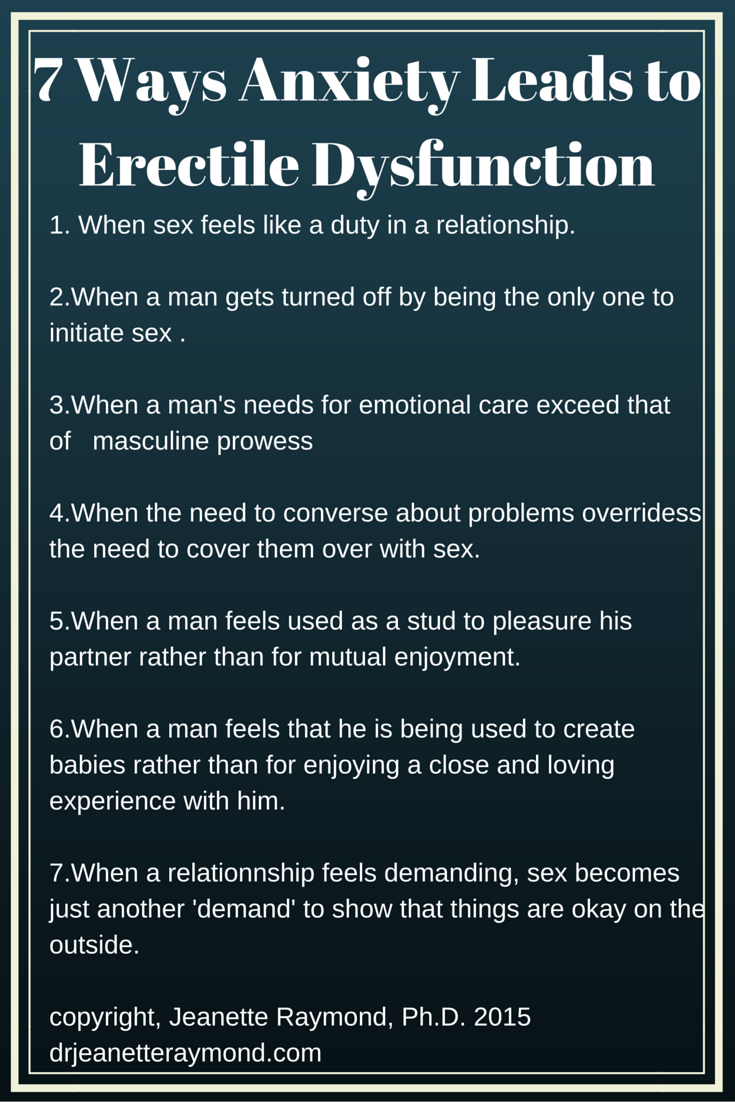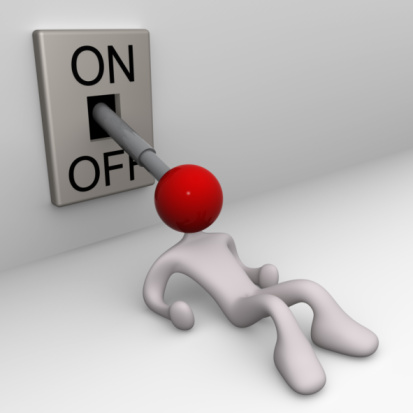Anger, Stress and Anxiety Management Tips for Satisfying Relationships

WHAT IS ERECTILE DYSFUNCTION?
When a man is unable to get an errection despite stimulation from a partner or self-manipulation.

How do you know if your Erectile Dysfunction is physiological or psychological?
When it occurs with one partner but not another it's psychological
If you can masturbate but can't get erect for intercourse its psychological
If you can't get to the point of orgasm by any means, it's probably psychological with physical underpinnings

Anxiety and Erectile Dysfunction
Anxiety caused by relationship stress is the greatest precursor to Erectile Dysfunction that men face. The International Journal of Impotence Research (2003) reports that "anxiety plays a major role in the development of problems associated with Erectile Dysfunction."
Anxiety is an experience of anticipating a future threat or danger. The sympathetic nervous sytem gets ready to meet that danger by providing blood flow to your limbs so you can fight off an enemy or run for safety. Either way you need energy. But when you have no real enemy or threat, all that energy is floating around in the form of adrenalin, making you antsy, edgy and unable to relax. When you are in that state you are not up for being aroused sexually, because that would mean talking your eye of the potential threat.

Anxiety factor one: Needing nurturing – not to prove prowess
In his late 30's Brett a tall, handsome Olympic swimming coach was ashamed to admit that he suffered Erectile Dysfunction often, just nine months into his marriage. His thirty-seven year old wife Francine, a yoga instructor seemed understanding and didn't push things, but he felt that he let her down and was an inadequate partner. Highly anxious about not being a proper sexual partner, he came to therapy and discovered that he needed to feel cared for and treasured just for being himself, but felt that his masculinity precluded him from asking for it or even admitting he needed it. In fact he felt weak, disgusted with himself for wanting soft, gentle holding, concern and comfort. BECAUSE that's how he felt when he was a young boy wanting it from his mother, who admonished him, and made him feel dirty and bad for wanting her to nurture him.
He lived in constant anxiety about coming across as a wimp. He was angry that he had to live life feeling bad about his needs. Anger toward a parent is often dangerous, since you need your parent to provide for your basic needs. So the anger gets turned into anxiety, and Brett learned to use that anxiety when he was angry about not getting his emotional needs met. He covered the anxiety with his strong, beefy bravado, but it seeped through when he felt safe in the nest of a marriage. The nurturing and understanding response he got from Francine when Erectile Dysfunction prevented sexual intercourse felt good, and that was the way Brett got his emotional intimacy needs met.
Learning how to communicate his anger at getting what he needed helped Brett feel more in touch with his true self, not this fake 'strong guy' exposed by Erectile Dysfunction. It took a lot for Brett to work through his anger, stress, and fear of having needs and speaking them to his wife. But once he took his emotional needs seriously, so did Francine. Satisfying the starving emotional hunger for nurturing allowed Brett to let go of his anxiety and his Erectile Dysfunction.

Anxiety Factor two: Sexual performance becomes another duty creating anxiety based Erectile Dysfunction
Married just 6 months, 36-year-old Anil dreaded bed time. His 30-year-old wife Therese read books on marriage and told him that newlyweds should have sex at least 3 times a week. A hard working Chiropractor Anil was usually worn out when he got home and looked forward to down times. But he was also keen to prove himself a good husband and do his 'duty.' He imagined that Therese, a day-shift nurse at a convalescent home expected him to do his sexual duty and make love to her just as her book said. So when they got into bed, the pressure on Anil was enormous. His anxiety about performing when he didn't really want to hit the roof. Conflicted by his own need to sleep when his body wanted to switch off, and maintaining his image of a 'good, dutiful husband,' he would begin foreplay and just as intercourse was begining, Erectile Dysfunction stopped the sexual encounter. He apologized and she said it was fine, but he felt ashamed and wondered if she would tell her friends, or complain to her parents. But the tension between them increased and affected their flow of communication. Until Anil came t0 therapy to deal with his anxiety, triggered by his shameful Erectile Dysfunction.
In therapy we discovered that Anil had grown up always wanting to be the 'good son' to his mother. Fulfilling roles in the family setting were especially important when he watched his father turn to drink after his business failed. He never wanted to be like his father, and wanted to make up to his mother for his father's failings. Little Anil took on the role of superman when it came to performing family duties of care taking, meeting expectations, doing what was asked and sacrificing his own needs. He started to judge himself by how well he performed these familial duties. You can imagine how stressed and anxious he was that he wasn't the perfect son, brother, and now husband. The huge burden of responsibility Anil adopted from his childhood to be the 'good boy' and do everything right to make up for his father's flaws, now took a toll on his marriage.
Appreciating the impossible task he had given himself, Anil worked with me in therapy to find out what HE wanted and make it okay. He learned to tune into what felt right for him, acknowledge, own and respect it before jumping in to be that dutiful person that set himself up for failure. As he became more comfortable with what he wanted, he had sex with his wife when he and she both felt like it, rather than following some standard from a book. Anil's anxiety was significantly reduced as he gave himself permission to stop playing the hero, and just be himself. They actually had more sex than before, enjoyed the spontaneity, and thanked the Erectile Dysfunction for saving their marriage.

Anxiety Factor three: When a man feels used as a stud to pleasure his partner
In the second year of his marriage, Adean a twenty-seven-year old lawyer enjoyed sex with his beautiful wife Carrie, a twenty-nine-year-old court reporter. But he got turned off when she wanted to bypass the foreplay and just get to an orgasm. She pulled him to touch, lie or stimuate her in a way where she could climax quickly, caring nothing for his experience. He wanted her to enoy it as much as he did, but lately he felt like her pleasure toy. It made him feel disgusted with the sex act when she urged him to make her body scream out in ecstacy – pushed away as if he were a dirty rag immediately afterwards. Angry and hurt, he had fantasies of overpowering and hurting her. He couldn't talk to her because it made him feel crazy that he was complaining about a sex crazed wife! But his displeasure turned into anxiety each time sex was initiated by either one of them. The anxiety reached massive proportions as he tried to control himself and just work on Carrie, until Erectile Dysfunction ended everything. His wife was immensely frustrated and complained about his lack of staying power, depriving her of her right to be pleasured. He felt shame, but also some secret pleasure. Things continued down this path with Adean suffering scathing attacks from his wife about his inability to get and sustain an errection no matter how much she stimulated him.
Adean's anxiety and fear that he may never be able to have an errection again brought him into therapy. He was able to get an errection when he masturbated and when when watching sexy pictures, but not with his wife. Adean loved to please those that he loved. He felt good making others happy, often happier than if he had just satisfied his own need. But it hurt when other people took advantage of him and never wondered about his experience. He gave the message that he was a non-person and that's exactly how he was treated. It happened within his own family when his sister always got the best of everything and he just made do with left overs. At work, he was the one to take care of his assistants and the support staff, who offered neither thanks nor reciprocation. They slaved for the other attorneys, wanting their approval. Adean was a push over.
Therapy helped Adean gradually value himself and take care of himself without feeling selfish. He mourned his losses and began to value his own needs and wishes. It took a while before Adean was comfortable putting his sexual needs on a par with Carrie's. But he realized the cost of not doing so, and became a more equal sexual partner. He learned how to communicate his experience of Carrie using him, and they refreshed their sex-life. Erectile Dysfunction no longer came between them enjoying physical intimacy. But from time to time he found that he couldn't get an errection – as soon as he noticed it, he knew he had moved too far in the direction of making Carrie the only important one, and adapted accordingly.

Anxiety Factor four: When the need to converse superceeds that of sex
Coming home from a friend's house warming party 32-year-old CPA Morgan sat on his anger and hurt that Suzie, his 33-year-old partner had showed him up yet again. She was always saying something to embarrass him to make herself look good. She thought it was all a big joke, but it wounded him. Tipsy after a night of drinking, Suzie wanted to top it off with sex. He responded to her fondling, but his errection didn't hold up. Suzie grumbled, turned around and snored in her sleep, as if trumpeting his lack of ability to be a man.
He wanted to tell her how let down he felt when she talked disparagingly about him, making fun of his handyman skills,or his food tastes. But memories of Suzie dismissing his feelings as if he were a kid who wasn't worth paying attention to silenced him. Each time he tried to get up the courage to have it out with her he was flooded with anxiety and lost heart. He had made friends with a female co-worker in his Accountancy Firm, and she made him feel important. She listened and took him seriously. He had fantasies of running off with her. But he knew that wasn't the answer. While he made no scene in public when Suzie used him to humor herself, he found a new and strange power in the bedroom – his body didn't obey her, and in that way he got the upper hand. Anxiety about needing to talk about the relatoinship led to Erectile Dysfunction, which spoke for him.
Suzie seemed closed to discussing the power struggles in their marriage and the anxiety it produced for Logan. But when she realized that she might lose her husband who didn't seem to want her in bed at all, they came in for couples therapy. They benefitted from talking about their role expectations, but the breakthrough came when Morgan saw the connection between the way he felt humilated by Suzie and his father's humiliation at his mothers hand. He had fallen into that smae way of being, and Suzie obliged by playing the part he assigned her. Suzie too realized that she had learned from her mother that men needed to be kept 'down' or else they would cheat! With a great deal of work, they were able to come up with fresh goals and free themselves of their parents way of thinking. Talking became the precursor to any sex act, to clean themselves of anything that was making either feel bad in the relationship. As relationship anxiety faded and self-esteem grew, Erectile Dysfunction became a thing of the past, but a reminder of how bad things get when relationship issues go unaddressed.

Anxiety Factor five: When a man feels he is being used just to create babies
The wish for another baby was something 32-year-old Ken, a furniture importer shared with his wife. Dominque, a 31-year-old home maker was desperate to have a daughter. She had two sons that she adored, but she wanted to complete her family with a little girl before her biological clock killed her dream. Ken had visions of spoiling his little princess if she came along, but he didn't want to be a cog in the wheel of Dominque's ovulation cycle, her astrological charts, and her panicked way of approaching their sex life, for the sole purpose of fertilizing an egg. In fact when he was pulled into having sex at her insistence, he often lost the desire. When he wanted sex as part of the marital relaionship, Dominique pushed him away if she wasn't ovulating. He was merely a sperm donor and not her sexual partner any more.
Within six months of sex becoming a baby making endeavor, the couple rarely talked about anything else. Dominque was consumed with everything to do with having babies and in particular a girl. They drifted apart emotionally and Ken began to go off the idea of having another child if his marital relationship was the price to pay. He started to get anxious on the way home from work, and the anxiety rose to an almost paralysing levels when he was alone with his wife, after the boys were in bed. He dreaded getting texts from her to come home at all hours to have sex as many times as possible during her short ovulation time. On such a day he couldn't get an errection during one of Dominque's 'special times' and that's how it stayed for several weeks. Dominque went ballistic and anxious. She wanted him to try and ejaculate in a doctor's office and freeze it for artificial insemination, but he couldn't get an errection in those circumstances either.
Ken tried Viagra but his anxiety was so great that the drug failed to work. Even if he got a mild errection, he was sick to his stomach about having to do it on Dominque's schedule – being used just for his stud qualities. But he found himself excessively aroused when attractive women passed near him at work, or in other public places, afraid that his errection would show!
Eighteen months later, Dominque and Ken were alarmed that their marriage was threatened by the tension and lack of emotional intimacy in their day-to-day lives. Their boys were suffering, and they eventually decided to come to couples therapy. Dominique talked of her fear that she wouldn't be the kind of mother her parents brought her up to be if she was without a daughter before she was 35 years of age. She also spoke of her concern that Ken would be disappointed in her if she didn't produce a daughter because he wanted one so badly. Ken shared his sense of loss – the loss of his wife as his best friend, and sexual partner during this time of pressure to conceive a female child. Letting his wife know that he wanted her more than he wanted a daughter stabalized them. They were able to reconnect as I encouraged them to share their deepest fears and fantasies about not being the perfect spouse in terms of producing offspring. Couples therapy provided the platform for them to put their relationship at the center of their worlds, and show love sexually without thinking about making babies.
Ken's erectile dysfunction was cured and nine months after they completed the first phase of their couples therapy, Dominque conceived a daughter!

Anxiety Factor six: When sex is just another demand to pretend that things are really okay between a couple
Bored with his 11 year relationship with Venus, 39-year-old Logan,owner of a Dry Cleaning business spent a lot of time online to pass the time when he was at home. He signed up for classes to refocus his mind, and chatted a lot with friends on Facebook. Venus, a 38-year-old sales assistant, had fallen into a rut and rarely wanted to go out and socialize. She was content watching TV and cooking from time to time. But she had lost her spark. Her depressive tendencies had a profound effect on the couple's relationship. Logan loved her, but he felt trapped in an insular relationship that was slowly dying from the inside out. Venus had relied on Logan as her right arm, and thought she was assured of that for life. But she sensed that things had changed. Yet she didn't want to liven up. It was too much effort and not worthwhile.
Every Wednesday the couple had sex. It was their night to reaffirm that there was an adult sexual and emotional partnership between them. For over a year they went through a ritualistic sex act. Neither particularly enjoyed it, but it was a sign that they were still committed to each other. Out in the world Logan could still hold his head up as a loyal partner with an apparently functioning relationship. Most of their friends thought they were an ideal couple, and kept pushing them to get married. But then one Wednesday Logan was unable to get an errection. He had dreaded going to bed in order to perform this "lie" about what he really felt and it showed up with a dose of Erectile Dysfunction.
Alarmed that they might lose the only thing that proved they were still a 'unit', Logan did extensive research on Erectile Dysfunction online. He was too embarrassed to discuss it with friends, and felt less alone and ashamed when he discovered that many men experienced Erectile Dysfunction from time to time. But his anxiety got whipped up like a tornado. He was terrified that this was the first sign that Venus wasn't doing anything for him anymore, and that he would have to face talking to her about that, or even worse, consider splitting up. Time didn't make anything better between them. Each Wednesday night Venus would give him an 'out' if he wanted it, but he chose to make things work and tried his best to fantasize about sexy women, hoping it would produce an errection. But nothing happened worked. Logan took to numbing his anxiety with alcohol, hoping that Venus would just let things slide so that he wouldn't have to be a nervous wreck on Wednesdays.
Meal times and bedtimes were full of unspoken concerns about the status of their relationship. It got so bad that Logan's work was being affected. He was making mistakes with ordering chemicals and with payroll. He got short with customers. Colleagues took him aside and told him that he was putting his business in jepoardy. That brought Logan into therapy.
Wracked with guilt Logan needed permission to have negative feelings about a relationship that was no longer working. We learned that he had promised himself that he would never be like his father and leave his long time partner. He worked on his need to feel good only by proving that he was better than his father. Logan's guilt diminished when he discovered that he had been attracted to Venus because of her 'neediness' – and his need to care for her – to make up for what his father did. That was the point at which he allowed himself to find out who he was – other than the 'anti-father person!' For a long while, Logan was unable to come to terms with the fact that his relationship with Venus was not based on true connection and that he needed to address that.
Provided with the tools to communicate his true self in therapy, Logan found the courage to talk to Venus and found to his surprise that she already knew the relationship was flawed, and although angry at having to end her dependent ways, she agreed it was better to separate. They were able to have 'comfort' sex as Logan regained his ability to have an errection, and found a way to part in a way that allowed for sadness at the ending of a pairing, but also hope that a more authentic one was possible for both.

Anxiety Factor 7: When a man feels responsible for initiating sex at all times
Settled into a comfortable life with his wife, 33-year-old Dylan, an audio enginer, missed the early days of his relationship with 29-year-old Amelia, a mexican food franchisee. She was the one who came onto him, and made the first move in bed. Now she participated, but never showed that initial enthusiasm. She didn't take the lead, and Dylan felt less attractive, and less wanted than before. Initiating their sexual romps made him feel heavy, as if he was the only one who wanted to be physically intimate. Sometimes he felt he was forcing her to play the dutiful wife, and other times he felt that he had a right to experience his conjugal rights.
Lost confidence and concern about not being desireable made Dylan extremely anxious whenever he thought about having sex with his wife. He agonized with the pros and cons, trying to grapple with the burden of initiating sex when he felt so bad about himself as a lover. One night he had planned to take the lead and started caressing Amelia's arms and back as they settled into their bedtime routine. But instead of getting aroused, he was flooded with anxiety and was unable to get an errection. While Amelia didn't push him away or stop him from continuing the foreplay, Dylan felt she was just 'going through the motions.' He tried to stimulate himself but that didn't work. Amelia wanting to get the whole thing over with, also tried hand stimulation, but his anxiety over powered everything else.
A low grade depression took over from his anxiety, while Dylan tried to regroup from this wretched experience. Amelia tried to brush it off, but it was a serious blow to his manhood. He began to crave porn, strip clubs and hand jobs in order to wipe out his embarrasing experience. He restricted himself to hand jobs, and stopped trying to have sex with wife for quite some time. When he finally decided to try again, anxiety about failing to get an errection produced Erectile Dysfunction. Dylan's brain had made a strong connection with touching his wife and failure. Knowing that he was able to get errections with hand jobs, he entered into therapy and worked on the anxiety and fear he harbored towards his wife. First we talked about his experience of women in general and in particular his cold and neglectful mother. He had never felt wanted by her, especially when she said she never wanted children. She rarely held him, so he grew up longing to be as close to a woman physically as possible – to "get inside" – so he couldn't be ignored. When he met Amelia, she was so warm, affectionate and wanting him for sex that he believed his wish had come true. But now things had changed, and he was once again feeling the pain of being rejected in the most intimate of places.
Now Dylan's experience with his wife was bringing back all the hurt and powerlessness of his childhood. As he processed those wounds and began to heal, he brought Amelia into couples therapy with him, because he wanted the relationship to work. She came to help him and to restore their floundering connection. Invited to talk about their experience when one or other was the initiator of sex, they learned that they both wanted to feel desired and attractive, but that when Amelia was the one taking the lead, she sensed his need to be enveloped and comforted through sex, making it more like a maternal act. When Dylan initiated sex, then she felt more like he was a man wanting his wife as a woman rather than a mother.
Relieved at understanding each other's perspective, they fell into a more spontaneous pattern of love making without putting all the focus on who was initiating sex. Dylan no longer suffered from Erectile Dysfunction having treated the wounds of the past, showing up in a more emotionally mature place, where Amelia could enjoy taking the initiative and being the one on the receivng end. Of course Dylan too had what he wanted, a wife that took the initiative in bed.
Copyright, Jeanette Raymond, Ph.D.
AUTHOR OF:' Now You Want Me, Now You Don't! Fear of Intimacy: Ten ways to recognize it and ten ways to manage it in your relationship.
You might also like:
Why your sex life goes from fantastic to boring in the blink of an eye
Why your sex life is non-existant and how to get it going again
Why your sex life doesn't work and three ways to revive it
Disclaimer: this article is for educational and informational purposes only. There is no liability on the part of Dr. Raymond for any reactions you may have when reading the material or following the suggestions therein. Interacting with this material does not constitute a therapeutic relationship with Dr. Raymond.












































